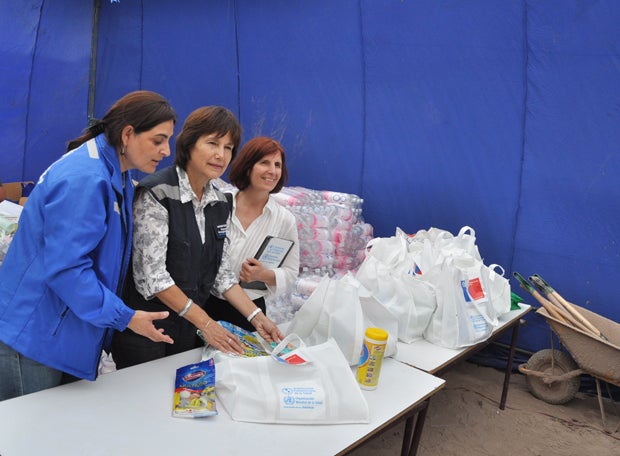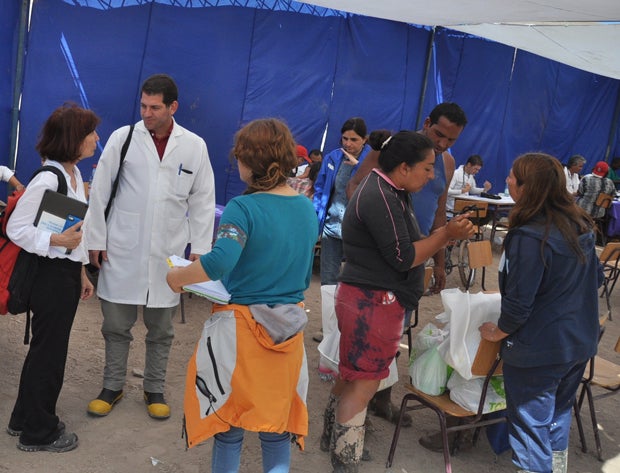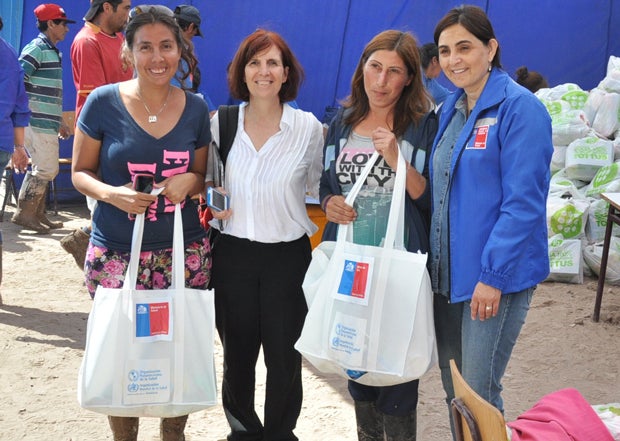

Communities affected by recent flooding in northern Chile will benefit from 200 water tanks and 200 hygiene kits donated by the Pan American Health Organization/World Health Organization (PAHO/WHO) to ensure that residents have access to safe water and sanitation.
Chile, 13 April 2015 (PAHO/WHO) — Communities affected by recent flooding in northern Chile will benefit from 200 water tanks and 200 hygiene kits donated by the Pan American Health Organization/World Health Organization (PAHO/WHO) to ensure that residents have access to safe water and sanitation.
 Brunilda González, health director of Seremi Atacama, examines PAHO/WHO-donated hygiene kits with Minister of health of Chile Carmen Castillo and PAHO/WHO Representative Paloma Cuchi.
Brunilda González, health director of Seremi Atacama, examines PAHO/WHO-donated hygiene kits with Minister of health of Chile Carmen Castillo and PAHO/WHO Representative Paloma Cuchi.
"This donation supports what the government, organizations, and the communities themselves are doing to try to return the situation in the north to normality as soon as possible," said PAHO/WHO's representative in Chile, Dr. Paloma Cuchi.
Lack of access to safe water and inadequate sanitary conditions increase the risk of water-borne diseases, such as hepatitis A and shigellosis, and diseases transmitted by animals, such as leptospirosis.
The PAHO/WHO donation was formally announced on April 10 in the city of Copiapo, in the Atacama Desert, during an event attended by Chilean Minister of Health Carmen Castillo and PAHO/WHO Representative Cuchi.
"PAHO/WHO has been collaborating with the Ministry of Health of Chile since the start of the emergency to ensure a rapid and coordinated response to the situation and to prevent possible disease outbreaks," said Cuchi.

PAHO/WHO Representative Paloma Cuchi talks with members of a Cuban medical brigade who are helping people affected by the flooding.
More than 30,000 people were affected by heavy rains and flooding in late March in the regions of Antofagasta, Atacama, and Coquimbo, in Chile's north. Much of the regions' infrastructure was severely damaged, including water and sewerage networks, electric power systems and access routes to the affected areas.
The main hospitals of Copiapo, Diego de Almagro, and Chañaral were affected along with other health facilities that suffered structural damage and significant losses of medicines, supplies and equipment.
Immediately after the flooding, PAHO/WHO provided support to Chilean health authorities through its country office and by activating the Regional Disaster Response Team, which mobilized international experts in coordination, emergency management and health services to help carry out damage and needs assessments and to restore health services in Antofagasta and Coquimbo. PAHO/WHO also mobilized experts in water and sanitation, environmental health and toxicology to support health actions in the affected areas and experts in information management and decision-making to assist staff in Chile's Ministry of Health.
 Melisa Fernández Hinojosa, a mother of three in Copiapo, Chile, says she lost everything children during the flooding. In this photo, she and a neighbor receive a hygiene kit from PAHO/WHO Representative Paloma Cuchi and Seremi Atacama Health Director Brunilda González.
Melisa Fernández Hinojosa, a mother of three in Copiapo, Chile, says she lost everything children during the flooding. In this photo, she and a neighbor receive a hygiene kit from PAHO/WHO Representative Paloma Cuchi and Seremi Atacama Health Director Brunilda González.
PAHO/WHO will continue cooperating with Chilean authorities and coordinating action with other United Nations agencies in Chile to provide humanitarian assistance, limit human suffering, completely restore health services, prevent disease outbreaks, evaluate the potential impact on health of chemical contamination, and address other situations that could arise as a result of the emergency.
Links



